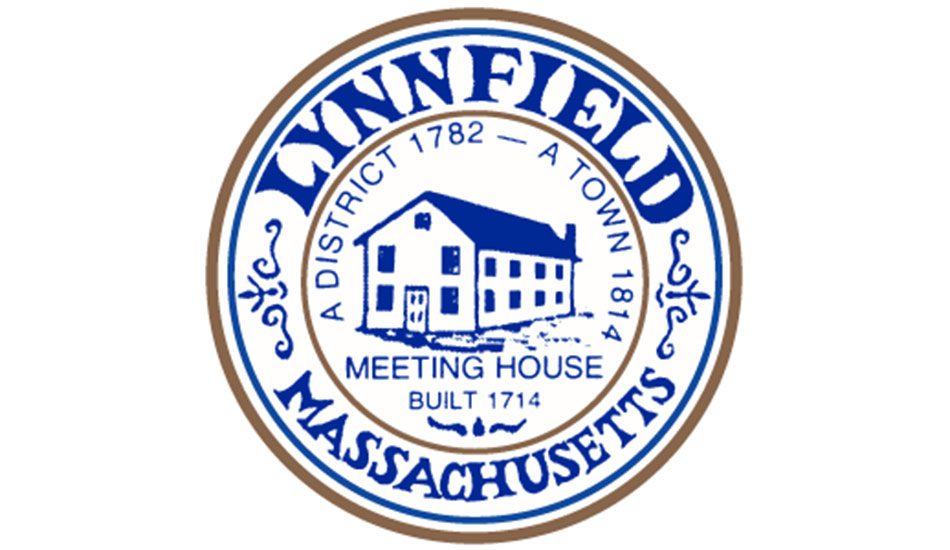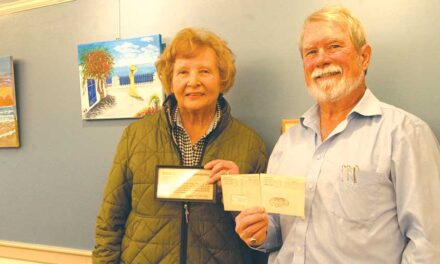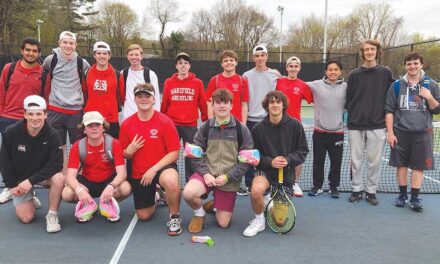By DAN TOMASELLO
LYNNFIELD — School Committee member Kate DePrizio got into a heated debate with her colleagues about the board’s approach to public participation during an April 5 meeting.
DePrizio, who aired her concerns a week before the Town Election, asked School Committee Chair Rich Sjoberg during the break between the annual public hearing on the proposed fiscal year 2023 school budget and the board’s regular meeting if she could make a statement about public participation before that portion of the meeting took place. Sjoberg agreed to her request.
“Over the last few days, I have received over 60 calls, emails and texts about how we handle public participation,” said DePrizio.
DePrizio, who also aired concerns about the format of public participation last September, said constituents have requested that the School Committee become “more engaged” with residents. She noted that the Planning Board attaches documents to each agenda about the different topics that will be appearing for that board. She said the School Committee should follow in the Planning Board’s footsteps by attaching meeting minutes, policies and any presentations that will be discussed.
“The public can consume that on their own time,” said DePrizio. “And when we give the public the opportunity to participate in public participation, they will be well informed. It maximizes the point of public participation and would be a step in the right direction.”
While DePrizio said she was “proud” of Sjoberg’s decision to move public participation from the end of the meeting to the beginning, she argued that the School Committee’s approach to public participation has created a “divide” in town.
“I would love for us to have an agenda item at our next meeting so we could all discuss public participation,” said DePrizio.
School Committee Vice Chair Stacy Dahlstedt said she was open to having a follow up discussion about public participation. In regards to proposed school policy changes, Dahlstedt recalled that the School Committee discusses the proposed changes in public and votes on them at the next school board meeting. She said the current practice gives the committee and public time to absorb and understand the changes.
“We certainly listen to the people who give public comment,” said Dahlstedt.
Sjoberg said he agreed to move public participation from the end of meetings to the beginning of them after a resident requested the change.
“I personally think it is better to have public participation at the end of the meeting before we vote on anything,” said Sjoberg. “But the public requested that we move it to the beginning, so we did. As chair, I have always listed public participation as an agenda item and it has always been an agenda item in the six years I have been on the committee. We have allowed every single person to speak who has asked to speak. We have allowed them to speak for longer lengths of time than is allowed our in our operating protocols.”
Sjoberg explained that the School Department uploads a variety of documents to the district’s website to make sure they are accessible to the public. He also noted that the committee brought hard copies of several proposed policy changes to the April 5 meeting to give attendees the opportunity to review them. After the meeting, the draft policy changes and the proposed calendar for the 2022-2023 academic year were both posted online.
“I am not sure what the issue is,” said Sjoberg.
DePrizio said the School Committee’s approach to handling public participation has created a “disconnect” with the constituents.
“I find it to be disingenuous,” said DePrizio.
Sjoberg objected to DePrizio’s characterization that the School Committee is being disingenuous with constituents.
“I find it to be disingenuous,” said DePrizio in response. “I think if we are encouraging them to fully participate and give us feedback, they have to be informed to do so.”
School Committee member Jamie Hayman asked DePrizio what types of items should be attached to agendas.
DePrizio said all agenda items that will be discussed by the School Committee “should be available for the public to access” before meetings.
“If they take advantage of it or not is on them,” said DePrizio.
DePrizio said it’s “a little disingenuous” to allow public participation if residents are unaware of the issues the School Committee would be discussing at a meeting.
Sjoberg objected to DePrizio’s use of the word disingenuous a third time.
“There is nothing disingenuous about the way we prepare for meetings, the way we allow public participation and the amount of time we give for public participation,” said a frustrated Sjoberg. “If you are going to continue to use the word disingenuous as if there is anything negative in our intention, I completely disagree with you.”
DePrizio said she was not “disagreeing” with the School Committee’s “intention.”
“I am disagreeing with our method,” said DePrizio. “I think our method needs improvement and the community screams for that. That’s why there is banter online. I would like us not to continue to perpetuate a disconnect that is as simple as attaching things to an agenda so it is available for public consumption.”
School Committee member Phil McQueen offered that the board gets meeting materials on the Friday before meetings are held on a Tuesday.
“I am absolutely 100 percent in favor of full transparency, but I could see banter exploding online over the weekend and that could turn into an issue when it might not even be an issue,” said McQueen. “We have seen that happen a lot of times over the last two years.”
McQueen said he supported continuing the School Committee’s current practice of handling policy changes because it gives both the board and the public time to process and understand the changes being considered.
“We don’t vote on things before meetings and we don’t discuss things outside of meetings,” said McQueen. “We look at things during our meetings.”
DePrizio asked McQueen why he had “fear, concern and apprehension” about giving the public access to policy changes at “the same time” the school board gets them.
“I don’t have any fear, concern or apprehension,” McQueen fired back in response.
DePrizio said the School Committee is participating in a “cat-and-mouse game” by not attaching documents to agendas.
“It seems like the gracious way to foster understanding,” said DePrizio.
Sjoberg was angered by DePrizio’s accusation.
“I completely disagree with the way you are characterizing the way we treat the public,” said Sjoberg. “It’s absolutely not true.”
Hayman was also livid. He accused DePrizio of violating the School Committee and Superintendent’s Operating Protocols that all five members signed at the beginning of the academic year. He said DePrizio did not communicate her concerns through Sjoberg or Superintendent Kristen Vogel in advance of the meeting.
“It is completely disingenuous of you to come here and violate all of the protocols that you signed,” said Hayman. “You agreed that there would be no surprises.”
DePrizio pushed back by stating her concerns were “not a surprise.”
“This is me being reflective about an email that we received last week and other emails about our agenda,” said DePrizio. “This is me being concerned. I am saying this because I have a frustrated public coming to me, and I am an advocate for the frustrated public. It’s not blind-sighted or catching you off guard. It is completely on topic and on point. I am encouraging us to do more.”
Hayman also stressed that School Committee meetings are “business meetings held in public” and are “not public meetings.”
“It’s still a public meeting where we conduct our business,” argued DePrizio.
Hayman disagreed.
“It’s a meeting for us to conduct our business,” said Hayman. “It’s not for the public to conduct it.”
The Open Meeting Law defines a public meeting as a meeting that is open to the public. According to Massachusetts General Laws Chapter 40A, Section 11, public hearings pertain to specific proposals such as a community’s operating budget or a zoning change, which are also open to the public.
Ironically, there were no residents who spoke during the public participation portion of the School Committee’s meeting even though a small number of attendees, including School Committee candidate Corrie Luongo, were sitting in the audience.
While DePrizio told Dahlstedt during the meeting she would share the emails she received from constituents, she informed the Villager that she has changed her mind.
“As soon as my committee meeting ended, I started to check in with the community members that had previously contacted me,” DePrizio stated in an email sent to the Villager. “Many had watched our committee meeting and others continue to see the contentious discourse online. They are adamant that they do not wish to have our correspondence shared. I will respect their wishes. As always, I have directed community members to the appropriate resources within Lynnfield Public Schools and encouraged them to share their concerns with all of the committee as well as Superintendent Vogel and Chair Sjoberg specifically.”
The Villager also asked DePrizio why she waited until a week before the Town Election to air her concerns about public participation to her colleagues after she initially raised her concerns last September. The Villager also inquired if she gave her colleagues advanced notice of her concerns.
“My continued advocacy for better communication between the School Committee and our community is ongoing,” said DePrizio in response. “The concerns and comments that I shared with my fellow committee members were the direct result of many community members reaching out to me asking for increased and timely distribution of committee policies and reference documents before they are discussed and adopted. Recently, in response to community request, public participation was moved to our first agenda item. I strive to continue our good work by being responsive to community concerns and fostering communication.”





